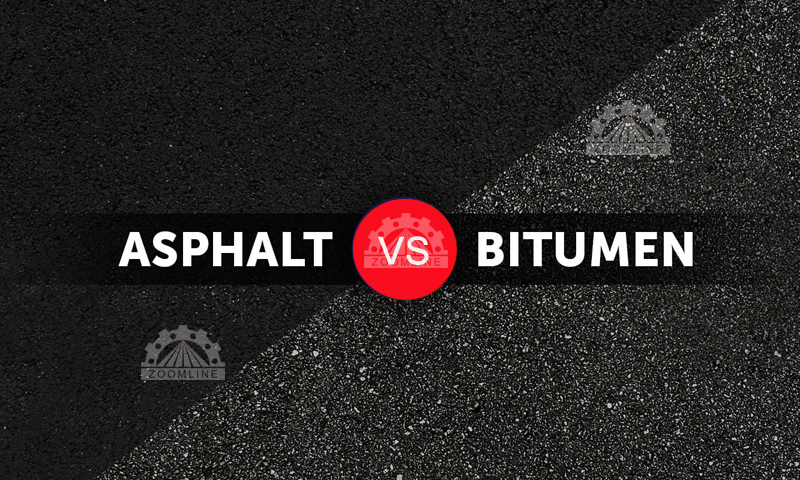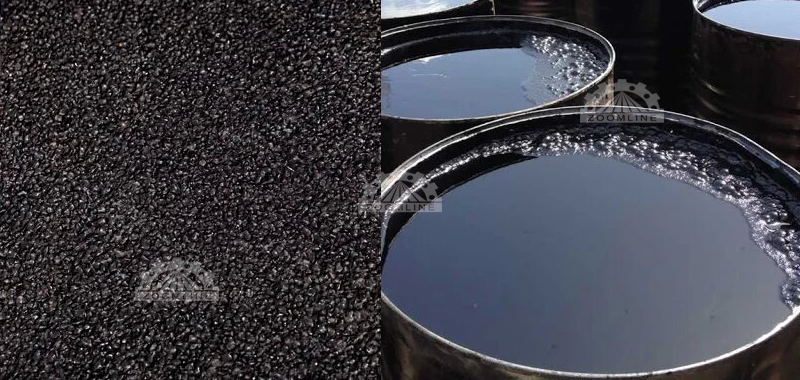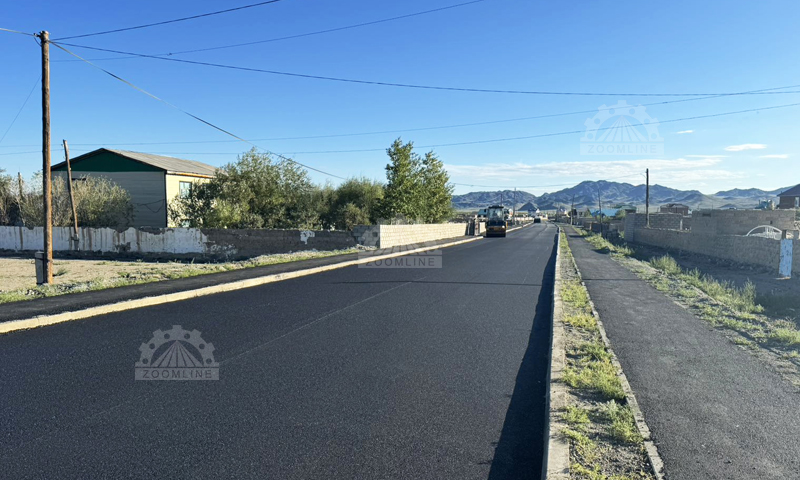In the field of road construction, the terms ‘asphalt’ and ‘bitumen’ are often used interchangeably, but in fact, there are significant differences between them. Understanding these differences is crucial for making informed decisions in infrastructure construction projects. This article will provide a detailed analysis of the differences between asphalt roads and bitumen roads, helping you make the appropriate choice based on your actual needs.
Asphalt is a dark, petroleum-like substance with a consistency ranging from a viscous liquid to a glossy solid. It is derived from natural deposits or petroleum distillation and primarily consists of hydrogen, carbon, nitrogen, sulphur, and oxygen.
Asphalt is typically composed of aggregates such as sand and gravel, and a binding agent is used to firmly bind these aggregates together. Its applications are extremely widespread; the surface coatings of parking lots, sidewalks, roads, airport runways, sports venues, industrial sites, and other structures we encounter in daily life may all utilize asphalt.
Bitumen is a liquid binder extracted from petroleum, primarily used in road construction, infrastructure development, and lane construction. Due to its excellent resistance to water and oil damage, it serves as an ideal binder for bitumen, which is commonly used as a surface material for roads, parking lots, and lanes.
It is important to note that bitumen binder is a different product from tar (used in bitumen gravel surfaces). It can be manufactured in various specifications depending on the intended application, making it suitable for a wide range of uses, including roads, parking lots, and driveways.

The service life of asphalt roads varies significantly, depending on the quality of the pavement and maintenance conditions. On average, however, an asphalt road has a service life of 15–20 years, and with proper maintenance, it can even exceed 25 years.
In contrast, the service life of asphalt-based roads is much shorter, typically requiring replacement after just 5 years, and asphalt must be reapplied before reuse.
Asphalt roads can be used under various weather conditions and have excellent durability, lasting for decades with proper maintenance.
Asphalt concrete roads are prone to cracking in winter when icy or overheated by direct sunlight if not maintained properly, making them more suitable for use in regions with mild climates.
Due to asphalt’s excellent skid resistance, asphalt roads are safer than asphalt concrete roads. Asphalt can be laid at much higher temperatures than asphalt concrete, so it maintains skid resistance even in winter, whereas asphalt concrete cannot.
Additionally, asphalt roads are quieter than asphalt concrete roads, which is one reason they are suitable for residential areas and communities, as they do not disturb people’s sleep.
Asphalt roads do not require frequent repaving and are easier to maintain in the long term, saving time and money.
Maintaining asphalt concrete roads is much more challenging, requiring more effort and cost to keep them in good condition.
Asphalt surfaces are smoother, providing vehicles with better fuel efficiency, allowing cars to travel more smoothly and efficiently while reducing fuel consumption.
Asphalt concrete surfaces are relatively less smooth, which may reduce vehicle fuel efficiency.
Asphalt roads have higher initial installation costs, but due to their longer lifespan and lower maintenance requirements, their long-term costs are lower.
Asphalt roads have lower initial costs, but due to their shorter lifespan and more frequent maintenance, their long-term costs are higher.
Asphalt roads are constructed using multiple layers of continuous paving without construction joints, resulting in a smooth and quiet driving surface. This not only enhances the driving experience but also improves fuel efficiency, reduces vehicle wear and tear, and extends the lifespan of the road surface.
Asphalt roads have lower initial costs and are recyclable, with residual value higher than other road surfaces. Additionally, asphalt roads can be constructed in phases, with the initial base layer laid first, followed by the surface layer after commercial buildings or residential areas are completed. This facilitates material storage and delays road construction costs.
A smooth asphalt surface maximizes tire-to-road contact, enhancing traction. Its dark color reduces glare, aids in melting snow and ice, and provides high contrast with lane markings. Furthermore, asphalt construction is fast, minimizing construction delays and reducing public safety risks during travel.
Asphalt is a flexible pavement, and this flexibility allows it to withstand occasional overloading. Depending on the climatic characteristics of different regions across the country, the gradation of asphalt binder varies to adapt to the environment, resisting summer rutting and the harsh freeze-thaw cycles of Iowa winters.
Asphalt pavement can be constructed for permanent use, known as permanent pavement. This thick-layer, full-depth pavement features an extremely flexible thick base layer, a high-strength load-bearing intermediate layer on top of the base layer, and a 2-3 inch wearing course above the intermediate layer. Every 18-20 years, the wearing course is milled off, recycled, and replaced with a new wearing course, while the intermediate layer and base layer remain sturdy and usable, eliminating the need for complete reconstruction.
Asphalt pavement construction is fast because it requires minimal “curing” time. Once the last roller leaves the construction area, drivers can use the road immediately. This means fewer delays and safer roads for the public.
Asphalt is the most recycled product in the United States, with over 80 million tons recycled annually, saving U.S. taxpayers over $1.5 billion. This also makes asphalt pavement sustainable, as less new oil is required to produce new asphalt pavement, and 80 million tons of new aggregate are preserved. Scientists are also working to develop pavement using 100% recycled asphalt.

When properly constructed, bitumen is renowned for its durability. In rural areas, roads often endure heavy traffic from agricultural machinery and livestock. The resilience of asphalt ensures that roads can be used for longer periods, reducing the need for frequent repairs—a significant advantage for rural communities with limited budgets.
One of the most notable advantages of asphalt pavement is the smooth driving surface it provides. The flexibility of asphalt allows it to conform to the base surface, reducing the formation of potholes and cracks. This smoothness enhances vehicle traction and reduces the risk of slipping, especially in wet conditions. For rural roads prone to uneven surfaces and dust, asphalt pavement offers a safer and more comfortable driving experience.
Although the initial cost of laying asphalt may be higher than some other materials, it is highly cost-effective overall. The durability and low maintenance requirements of asphalt mean fewer repairs and replacements are needed, and the reduced maintenance costs over the road’s lifespan can offset the initial investment. For rural areas with tight budgets, this cost-effectiveness is a significant advantage.
The properties of asphalt help improve drainage, as the material is waterproof and prevents water from pooling on the road surface. This is particularly important in rural areas with high rainfall, as it reduces water damage and erosion. Additionally, asphalt pavements help control dust emissions commonly found on unpaved roads.
Asphalt can be applied in various ways, from surface treatments to full-depth asphalt paving. This flexibility makes it suitable for diverse road conditions and requirements. For rural roads with varying traffic volumes and environmental conditions, asphalt can be adjusted to meet specific needs, thereby maximizing performance and lifespan.
Rural areas often experience a range of weather conditions, from extreme heat to heavy rain. Asphalt’s resistance to extreme temperatures ensures the pavement remains stable under harsh conditions. In hot climates, asphalt does not soften excessively; in cold climates, it resists cracking and brittleness. This weather resistance is crucial for maintaining the functionality and safety of rural roads throughout the year.
Compared to some other road materials, asphalt surfaces help reduce noise pollution, which is important for rural areas as it minimizes the impact of traffic noise on residents’ quality of life.
Asphalt is a dynamic construction material celebrated for its durability, flexibility, and cost-effectiveness. Composed of bitumen—a sticky petroleum-based binder—and aggregates like sand, gravel, and crushed stone, it has become a cornerstone of global infrastructure, playing a pivotal role in countless projects, from massive highways to residential driveways. Let’s dive into the diverse applications that make asphalt an indispensable resource worldwide.
When it comes to road construction, asphalt reigns supreme. It is the go-to material for building and resurfacing roads, highways, and expressways across the globe. Hot Mix Asphalt (HMA) stands as the gold standard for flexible pavements, delivering smooth, resilient surfaces capable of withstanding heavy traffic loads. One of its greatest advantages is speed—asphalt roads are quick to install and straightforward to maintain, minimizing disruption to commuters. Remarkably, over 90% of paved roads worldwide rely on asphalt, a testament to its reliability in keeping global transportation moving.
Homeowners and businesses alike turn to asphalt for driveways and parking lots, and it’s easy to see why. Asphalt offers a winning combination of low cost and fast installation, making it a practical choice for both residential driveways and commercial parking areas. Beyond functionality, its smooth black finish adds aesthetic appeal to properties. What’s more, asphalt stands strong against harsh weather conditions and is simple to repair, ensuring long-lasting value for homes and businesses.
Airports depend heavily on asphalt for critical infrastructure. Runways, taxiways, and aprons all benefit from asphalt’s exceptional load-bearing capacity and smoothness, which are non-negotiable for safe and efficient aircraft operations. Whether handling the weight of large commercial jets or ensuring precise maneuvering of aircraft, asphalt provides the stability and performance that airports demand.
In industrial settings, asphalt proves its mettle in high-stress environments. Factories, warehouses, and freight terminals utilize asphalt for loading docks, storage yards, and heavy-duty traffic zones. Its inherent flexibility is a game-changer, as it reduces cracking even under the immense stress of heavy vehicles and machinery, ensuring long-term durability in busy industrial spaces.
Asphalt’s utility extends far beyond pavements. In processed forms, it shines in roofing and waterproofing applications. Asphalt shingles are a popular choice for roofing, offering reliable protection against the elements. Additionally, it is used in waterproof membranes for basements and foundations, as well as damp-proof coatings on concrete, safeguarding structures from moisture damage.
Asphalt serves as a versatile protective and insulation coating in various contexts. It is applied to vehicle under-bodies to shield against corrosion and damage, and to pipelines for long-term corrosion protection. Moreover, it plays a role in soundproofing, used in noise barriers for buildings and transportation infrastructure, helping to reduce unwanted noise pollution.
Modern asphalt technology is embracing sustainability and innovation. Porous asphalt aids in storm-water management by allowing water to infiltrate the ground, reducing runoff. Rubberized asphalt, made using recycled tires, enhances durability while promoting recycling. Researchers are even exploring self-healing asphalt, which has the potential to extend pavement life. Additionally, cold mix and warm mix asphalt options reduce emissions during production, aligning with global efforts to minimize environmental impact.
From the roads we drive on to the roofs over our heads, asphalt’s versatility makes it an essential material in building and maintaining the infrastructure that powers our daily lives. Its adaptability, combined with ongoing advancements, ensures it will remain a key player in construction for years to come.

Bitumen, often referred to as asphalt in North America, sticky substance derived from petroleum. Its unique blend of binding, waterproofing, and adhesive properties makes it indispensable across numerous industries. From the roads we drive on to the roofs over our heads, bitumen plays a silent yet crucial role in modern infrastructure. Let’s dive into its key applications.
Undoubtedly, the most common use of bitumen is in road construction—accounting for over 70% of global consumption. Hot Mix Asphalt (HMA) is the star here: bitumen acts as a glue, binding aggregates like stones and sand to create durable road surfaces. These surfaces form flexible pavements that can handle heavy trucks, constant traffic, and extreme weather conditions without cracking. When potholes appear or roads need resurfacing, cold mix asphalt (another bitumen-based product) comes to the rescue for quick, effective maintenance. It’s no exaggeration to say that bitumen keeps the world moving, one road at a time.
Bitumen is a champion of keeping water at bay in construction. For flat roofs, it’s transformed into waterproof roofing felts and membranes, forming a tough barrier against rain and snow. In buildings, it’s used in Damp-Proof Courses (DPCs) to stop moisture from seeping into walls and floors, and as a protective layer for foundations, shielding them from underground water. This waterproofing power ensures buildings stay dry and durable for years.
Bitumen emulsions are a game-changer for low-temperature projects. Perfect for rural roads or cold-weather roadworks, they’re used in priming, tack coats, and surface dressing. Unlike hot mix asphalt, emulsions don’t require high temperatures, cutting down on energy use and making them more eco-friendly. They’re a smart choice for sustainable construction practices.
Beyond construction, bitumen finds its way into various industrial applications. It coats steel pipes to prevent corrosion, ensuring they last longer underground or in harsh environments. In batteries and cables, it acts as an insulating sealant, protecting against damage and improving performance. Bituminous paints and adhesives also play a role—they shield metal and concrete surfaces from wear and tear, and act as strong adhesives in flooring and tile installations.
High-performance bitumen grades are trusted in critical areas like airport runways and racetracks, where durability under extreme stress is non-negotiable. It even contributes to quieter spaces: bitumen sheets are used in soundproofing materials for better acoustic insulation. For a touch of style, colored or stamped bitumen creates decorative pavements, blending functionality with aesthetics.
In short, bitumen’s versatility makes it a cornerstone of modern infrastructure and industry. Its ability to adapt to different needs—from heavy-duty roadways to delicate waterproofing—ensures it remains a vital resource worldwide.
In the construction of asphalt pavement, the ratio of aggregates to bitumen is crucial. This precise mixture ensures that the asphalt can withstand prolonged vehicle pressure without becoming overly dry and cracking. The flexibility and adhesive properties of bitumen make it an ideal binder, contributing to asphalt’s ability to withstand various weather conditions and heavy use without degrading.
Recognizing the differences between bitumen and asphalt helps industry professionals make informed decisions about the materials they use for construction projects. It also ensures the correct application of each material for optimal performance and longevity of infrastructure projects.
Bitumen and asphalt, while closely related, serve different purposes in the construction sector. By distinguishing between the two and utilizing each in their respective applications, construction professionals can achieve better, more durable results for infrastructure projects.
As we’ve discussed above, asphalt has a higher price point, lasts longer, is more tolerant to extreme temperatures, and is designed for high traffic roads, plus it’s great for laying on sloped surfaces. When laid properly, asphalt will last and provides a smoother, more durable road surface for decades.
Bitumen is a part of asphalt and is a great binder, commonly used for rural roads as it’s easy and cheaper to use and can simply be sprayed over existing paved areas for quick repairs. If you’re after something more short term, bitumen can be recycled rather than going to a landfill. However, keep in mind that it can cause pollution to soil and groundwater, so it’d be best to not use near any protected habitats or wetlands.
If we’re going strictly on price, bitumen is the way to go with its cheaper installation costs and is a good investment for resurfacing roads with low traffic volumes. Asphalt on the other hand is more expensive but is also the most cost-effective thanks to its 20 plus year lifespan only requiring periodic maintenance.
Weighing up the pros and cons, asphalt has more benefits and less disadvantages than bitumen.
In summary, asphalt roads and asphalt-based roads exhibit significant differences in terms of definition, construction methods, service life, durability, skid resistance, maintenance requirements, and cost.
When making a selection, it is essential to consider factors such as the specific requirements of the project, climatic conditions, and traffic patterns to choose the most suitable pavement type. Only by making an informed material selection can the durability and optimal performance of infrastructure be ensured, thereby providing better safeguards for people’s travel and daily lives.